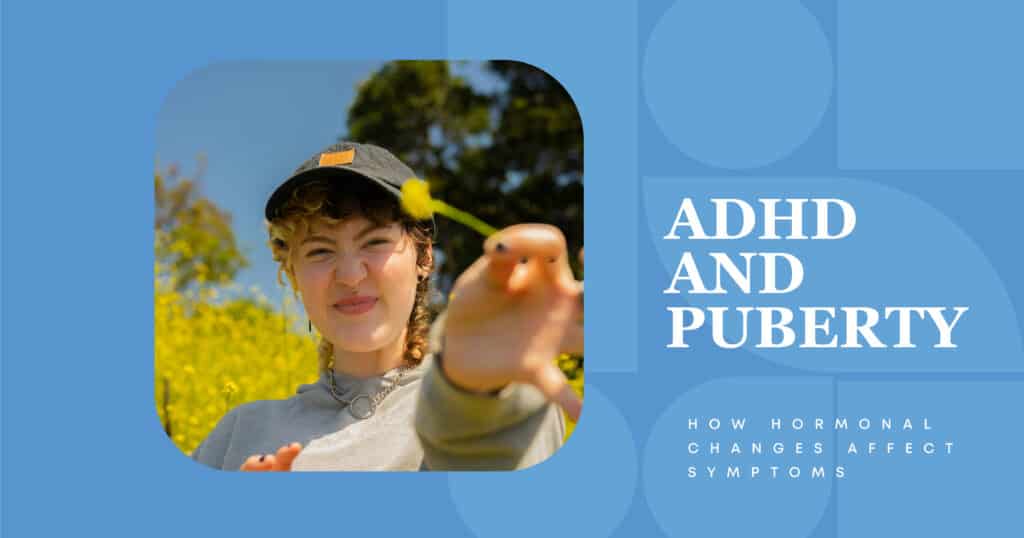Attention Deficit Hyperactivity Disorder (ADHD) shows up pretty early in life, and you’ll usually spot it by the way it messes with focus, energy, and impulse control. For a long time, it was associated with childhood. It was also believed to fade out with age. But the truth is, about 5% of adults around the world are living with it today.
Historically, ADHD diagnoses leaned heavily toward males. Girls often flew under the radar, partly because they were better at masking their struggles. Hormones can seriously influence how ADHD shows up, and the experience can differ a lot between boys and girls.
Research now makes it pretty clear: there’s a real connection between ADHD and puberty. Let’s dig into how these hormonal rollercoasters shape ADHD symptoms.
How Puberty Can Amplify ADHD Symptoms in Teens
If you ask the experts, puberty is a complex and high-stakes period when it comes to ADHD in teens. Some might spiral into bad habits like substance abuse, reckless behavior, and endless hours online, while others might actually experience a turning point and get better at managing their ADHD.
Puberty triggers a major hormonal storm. Boys get hit with a rush of testosterone; girls see surges in estradiol and progesterone. These biological changes can shift ADHD symptoms significantly.
ADHD Symptoms in Teenage Boys
When boys experience that testosterone boost, their risk-taking tendencies can go into overdrive. If a boy already has ADHD, this spike just magnifies things. Suddenly, fitting in with peers, even if it means risky stunts, becomes a major priority.
ADHD Symptoms in Teenage Girls
For girls, their hormonal changes often fuel emotional storms. Teenage girls with ADHD might start struggling more with academics, fighting mood swings, or even turning to substances to cope. Unlike boys who tend to act out, girls often internalize their battles, leading to deeper anxiety or sadness. No wonder ADHD teenage girls sometimes get overlooked.
Common ADHD Challenges During Adolescence
Puberty is tough on everyone. But toss attention deficit disorder in a teenager’s life, and things can get even messier. If left unchecked, these issues could stick around and mess with a teenager’s future.
Here’s a quick breakdown of how these symptoms play out:
| Symptoms | Areas of Manifestation |
| Inattention | Academics, social interaction, and organization |
| Impulsivity | Emotional, behavioral, and social |
| Hyperactivity | Physical and verbal |
Academics
High school’s no joke. Between heavier workloads, tests, projects, and applications, it’s a constant balancing act. Add sports, clubs, or part-time jobs? It’s overwhelming.
A teen dealing with ADHD symptoms in teens might struggle to keep up. They may forget assignments, bomb tests, or even need frequent breaks just to keep going. Studies show these students have a higher dropout rate, and sadly, this can echo through the rest of their lives.
Substance Intake
Sadly, teens with ADHD are at greater risk of dabbling in recreational drugs. Besides the obvious health risks, these substances can wreak havoc on brain development, sleep cycles, and academic performance.
Social Struggles
Friendships can feel like navigating a minefield. Impulsivity, zoning out mid-conversation, and missing social cues make it harder for ADHD teens to connect. Many end up feeling isolated or rejected.
High-risk Behaviors
Impulsiveness doesn’t just mess with homework. It can push teens into thrill-seeking, like reckless driving or butting heads with authority. Those adrenaline-chasing habits are tied directly to how ADHD and hormones interact.
Is It ADHD, Puberty, or Both? Knowing What to Look For
It’s tricky to tell sometimes. Puberty alone can cause huge emotional swings, moodiness, and focus problems. So, how do you tell if it’s ADHD and puberty acting up or just normal teenage chaos?
One clue: true ADHD signs show up early, usually in childhood. If behaviors like inattention or hyperactivity were there before puberty, odds are it’s ADHD, not just hormones.
But yes, puberty can crank up those symptoms. It also raises the odds of teens grappling with anxiety or depression alongside ADHD. Knowing the difference really matters for getting the right support.
Helping Teens Navigate ADHD During Puberty
When you’re parenting a teen with ADHD, it helps to remember this: puberty is like gasoline on a fire. It makes everything, good or bad, burn a little hotter.
Supportive Strategies That Don’t Overwhelm
Here’s how you can be a real support system for your teen:
- Validate their ideas. Even if you don’t agree with what they’re saying, listen. Teens crave being heard. Resist jumping in with “solutions” unless they ask.
- Improve on Lifestyle. Basic changes like good food, sleep, and exercise make a huge difference. Help them manage stress before it spills over. Keep an eye on their schedules and gently steer them back when life gets overwhelming.
- Be non-judgmental. You’re their safe place. Show compassion. Let them vent without fearing judgment. That safe outlet might be the thing that saves them.
- Empowerment. Teach them about ADHD and how it impacts their behavior. The more they know, the more they’ll feel in control, and that’s empowering.
- Be patient. Change is slow. Progress might not be obvious day-to-day, but trust me, your support matters more than you know.
- Offer to create their schedules. Help them set a clear, manageable daily routine. It’s easier to thrive when life feels predictable.
- Therapy. Finding the right therapist can be life-changing. Cognitive behavioral therapy, for example, teaches coping skills, social navigation, and emotional management. It’s a game-changer for teens dealing with ADHD and teenage struggles.
Do ADHD Medications Work Differently During Puberty?
The short answer is sometimes they do. Hormones can mess with how medications work. For instance, changes in estrogen and progesterone might weaken the effects of some ADHD drugs. But it’s not a universal thing. Responses vary a lot.
One interesting find? Estrogen may actually boost the effectiveness of amphetamine-based treatments. But again, everyone’s different, and that’s why it’s crucial to have a doctor monitor any changes.
Here’s a snapshot of the main medication types:
| Drugs | Effects |
| Stimulants | They boost dopamine and norepinephrine levels to sharpen focus and control impulses. |
| Non-Stimulants | They tweak norepinephrine activity to calm hyperactivity and improve attention spans. |
| Antidepressants | Useful if depression’s tagging along with ADHD, helping mood and focus. |
If it feels like your teen’s medication isn’t cutting it anymore after puberty hits, don’t wait. Reach out to their healthcare provider to talk about reviewing their medications.
Wondering If It’s Time to Get Support? Hillside Horizon for Teens Can Help
Living with ADHD can feel like an uphill battle for both the teen and their family. Struggles at school, broken friendships, and emotional blowups can all add up fast.
When you notice those struggles, it’s time to act. Hillside Horizon for Teens has expert and licensed therapists ready to help your teen navigate these challenges. We use evidence-based treatments for ADHD that really work. Contact Hillside Horizon for Teens today – your teen deserves every shot at success.
FAQs
Can puberty make ADHD worse?
Yes. Puberty can amplify ADHD symptoms in teens, making focus, mood, and behavior regulation way harder. But it’s not all doom and gloom. With patience, understanding, and the right strategies, things can get better.
How do hormonal changes impact ADHD symptoms?
ADHD and hormones are tightly linked. Girls often notice more problems when estrogen drops and progesterone rises. Boys might see issues spike with higher testosterone levels.
What are common ADHD challenges during adolescence?
The biggest hurdles? Impulsiveness, risky behavior, drug experimentation, social isolation, and emotional blowouts. Sometimes it shows up alongside depression, anxiety, or learning difficulties.
How can parents help teens with ADHD during puberty?
Get informed about ADHD symptoms in teens and ADHD teenage development. Build solid routines, keep lines of communication wide open, and stay patient. Therapy can also be a game-changer.
Are ADHD medications affected by puberty?
Hormonal shifts can alter how medication works. If a treatment that once helped suddenly seems useless, get your teen’s doctor involved fast. There are always options.




